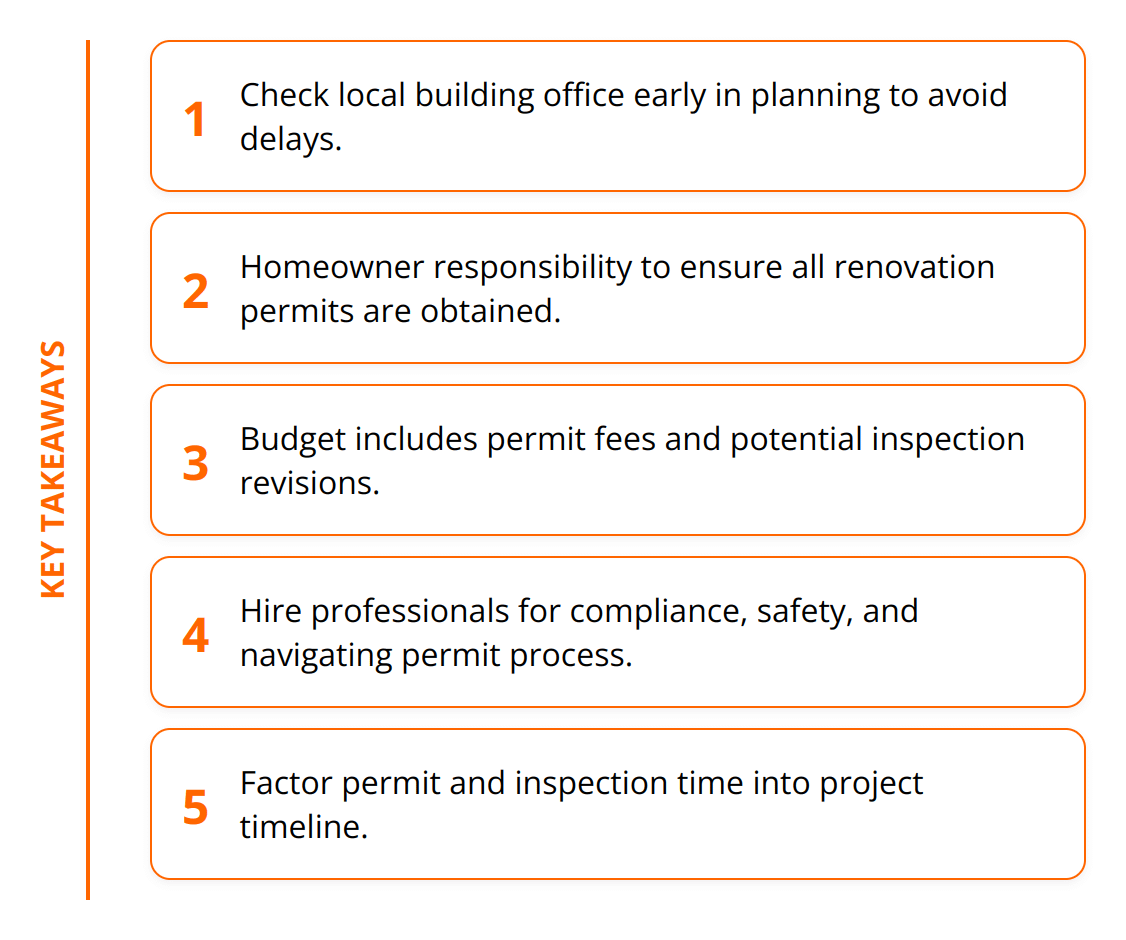
Navigating the complexities of renovation permits can often feel like an overwhelming hurdle for homeowners. We at JBS Remodeling understand the importance of being well-informed about this critical aspect of home renovation. This guide aims to demystify the process, highlighting why these permits are necessary, how to obtain them, and how to sidestep common mistakes. Ensuring your project complies with local regulations is not just about legality; it’s about safety and value too.
Renovation Permits Explained
Permits for renovation may seem like just another step in the project planning process, but they play a crucial role in ensuring that your home improvement efforts are both safe and up to code. The world of renovation permits can often be confusing, yet knowing the basics can save you from potential headaches and unnecessary expenses.
What Are Renovation Permits?
At their core, renovation permits are official approvals granted by local government agencies. These documents confirm that your planned project complies with building codes, zoning laws, and safety standards. Obtaining these permits is a legal requirement for various types of construction and remodeling projects. The goal is to ensure the safety of the occupants and the community, maintain a certain standard of construction, and preserve property values.
Why Homeowners Must Pay Attention
Ignoring the permit process can lead to significant consequences. Working without the necessary approvals can result in fines, the halting of your project, or even the forced removal of unauthorized work. Furthermore, unpermitted renovations can cause complications when selling your property, as potential buyers and their lenders scrutinize the legality and quality of all modifications.
Key Projects That Require Permits
Although permit requirements can vary by location, certain projects almost universally need approval, including:
-
Structural changes: This encompasses projects like removing or adding walls, especially load-bearing ones, and altering the home’s footprint.
-
Major electrical or plumbing work: Updating your home’s electrical system or moving plumbing lines requires a permit to ensure everything meets safety standards.
-
Exterior additions: Building a deck, installing a pool, or extending your home’s living space are changes that affect the exterior silhouette and often need a permit.
It’s not just about obtaining a piece of paper. The permit process often includes inspections by officials to verify that the work meets all necessary standards. This step serves as an additional layer of consumer protection, catching potential issues that could affect your home’s safety.
Practical Tips for Navigating the Permit Process

-
Start early: Check with your local building office as soon as you’re planning your project. This can save you from delays or having to redo work.
-
Know your responsibilities: In many cases, your contractor will handle permits, but ultimately, it’s the homeowner’s responsibility to ensure all necessary paperwork is in place.
-
Understand the costs: Permit fees vary by project and locality but prepare for them to be a part of your budget.
-
Consider the timeline: The permit process can take time. Factor this into your overall project planning to avoid frustration.

By paying attention to these details, you can navigate the permit process more smoothly, avoiding common pitfalls and setting your project up for success. For more insights on managing your renovation project, look at home repairs services and kitchen renovation guidance.
Preparing thoroughly for this step and working with experienced professionals can help ensure that your renovation goes as smoothly as possible, from concept to completion.
Obtaining Your Renovation Permit
Successfully securing a renovation permit requires a clear understanding of the application process, necessary documentation, and what to expect in terms of timing and fees. It’s not merely about filling out paperwork; it’s about ensuring that your renovation project progresses without unnecessary interruptions.
The Process of Applying for Permits
The initial step involves contacting your local building office to gather information on the specific requirements for your project. This can vary significantly by location, so make sure you’re getting advice directly relevant to your area. Generally, the process involves submitting a detailed plan of your proposed project, which must often include architectural or engineering drawings.

Necessary Documentation and Fees
One of the most critical aspects is preparing the necessary documentation. This typically includes detailed construction plans, a site plan showing the property and detailing the location of the renovation, and sometimes even photos of the current state of the project area. You may also need to provide proof of property ownership and, depending on the project, approvals from other local departments.
Fees are an unavoidable part of obtaining permits. These can range from nominal to quite substantial, depending on the scope of your project and your locality. These fees contribute to the cost of the inspections and the administrative work involved in the permit process. Always factor these costs into your overall project budget to avoid surprises.
Timing and What to Expect
Patience is key when applying for permits. The waiting time can vary from a few days for simple projects to several months for more complex renovations. The timeline often depends on the current workload of the permitting office and the complexity of your project. During busy times, expect delays. Complex projects may also require multiple rounds of revisions before approval is granted.
Moreover, the inspection process is an integral part of obtaining a renovation permit. Be prepared for the possibility of required changes following these inspections, which could affect your project timeline and budget.
Quick Tips:
-
Always start early to avoid project delays.
-
Gather all necessary documentation before applying.
-
Budget for permit fees as part of your project costs.
-
Prepare for inspections and possible plan revisions.
-
Stay patient and flexible, especially for complex projects.
Amidst the hassle and paperwork, it might be tempting to skip the permit process, but doing so can have legal and financial repercussions. With proper preparation and understanding, navigating this process becomes less daunting and more a part of the journey to transforming your space.
For a deeper dive on planning your renovation effectively, consider reading about planning your kitchen layout or creating a spa-like bathroom. These can provide additional insights into making the most out of your renovation projects, with or without significant structural changes.
By adhering to local regulations and obtaining all necessary permits, you are not only ensuring the legality of your project but also its safety and quality. This diligence pays off in the long run, preserving the value of your home and ensuring peace of mind.
Avoiding Renovation Pitfalls
Renovation projects are complex endeavors that demand careful planning and execution. One of the significant aspects often underestimated or overlooked by homeowners is the intricacies of local regulations, time requirements, and the necessity of hiring professionals. Navigating these areas successfully can make the difference between a smoothly executed project and one fraught with delays, increased costs, or even legal troubles.
Ignoring Local Regulations: A Risky Move
Many homeowners might be tempted to bypass the permit process, particularly for what they perceive as minor updates. However, this approach can lead to significant legal issues, including fines and complications with insurance or future property sales. Every renovation, no matter its size, needs to respect local regulations, which are in place to ensure safety and compliance with building standards. It’s imperative to visit your local building department’s website or contact them directly to understand the specific requirements for your area.
The Clock is Ticking: Underestimating Time
Underestimating the time needed for obtaining permits and completing inspections is another common pitfall. The permit process can vary greatly in duration, ranging from a few days to several months, based on the project’s complexity and the local office’s backlog. Furthermore, inspections can reveal issues that need fixing, adding more time before project completion. To prevent frustration, factor in extra time for these processes when planning your renovation schedule.

The Expertise of Professionals
Tackling a renovation project without professional help might seem like a way to cut costs, but it can end up being far more expensive in the long run. Mistakes due to inexperience can lead to costly repairs or adjustments, not to mention potential safety hazards. Hiring a professional ensures that the work is done right the first time, adhering to all codes and regulations. Additionally, professionals are familiar with the permit process and can navigate it more efficiently, saving you time and hassle.
Practical tips:
-
Always consult local building codes and regulations before starting a project.
-
Factor permit time into your project timeline.
-
Include potential inspection findings in your budget planning.
-
Consider professional services for complex projects to ensure compliance and safety.
Understanding and addressing these areas can significantly contribute to the success of your renovation project. Not only does it prevent unnecessary delays and costs, but it also guarantees that the work done boosts your property’s value and safety. For more about navigating the complexities of renovation, our guide on kitchen renovation guidance offers further insights into effectively managing your project from start to finish.
Final Thoughts
Understanding the necessity and process of obtaining renovation permits is fundamental for anyone planning to undertake home improvement projects. These permits serve as a testament to the safety, legality, and compliance of your renovation, ensuring that every change made to your property abides by local regulations and building codes. Renovation permits are not mere formalities but essential steps to protect your investment and the well-being of your community.

Here are key takeaways on the importance of adhering to legal requirements for home renovations:
-
Safety first: Ensuring that your renovation project meets safety standards is paramount. This not only protects those who live in or visit your home but also ensures the long-term durability and integrity of your property.
-
Legal compliance: Bypassing the permit process can lead to fines, delays, and complications that could affect your property’s value and your ability to sell or insure your home in the future.
-
Value preservation: Renovations done with the necessary permits in place can significantly enhance the value of your property, making it more appealing to potential buyers and lenders.
We at JBS Remodeling strongly encourage homeowners to understand and adhere to the permit requirements for their renovation projects. As experts in kitchen and bath renovations in Arizona, we bring over a decade of experience to ensure your projects are not only beautiful but also comply with all necessary standards. Whether it’s a sophisticated bathroom remodel, a bespoke kitchen update, or elegant additions to your home, we’re here to guide you through every step of the process, including navigating the complexities of renovation permits. At JBS Remodeling, we take pride in being the top choice for kitchen renovations, offering unparalleled craftsmanship and personalized service. Our team works closely with local authorities to ensure every aspect of your remodeling project is up to code, giving you peace of mind from start to finish. Let us help bring your vision to life while ensuring all legal and safety requirements are met seamlessly.
For those who are planning a remodel and want to avoid the common pitfalls associated with renovation projects, we offer resources, insights, and professional services tailored to meet your needs. Our dedication to quality, transparency, and customer satisfaction makes us an ideal partner for bringing your renovation dreams to life.
To learn more about how we can help you transform your home while adhering to all necessary legal requirements, visit our website at JBS Remodeling.
By taking the time to understand the importance of renovation permits and working with experienced professionals, you are setting your renovation project up for success. This approach not only ensures a smoother process but also results in a safe, legal, and valuable improvement to your home.
